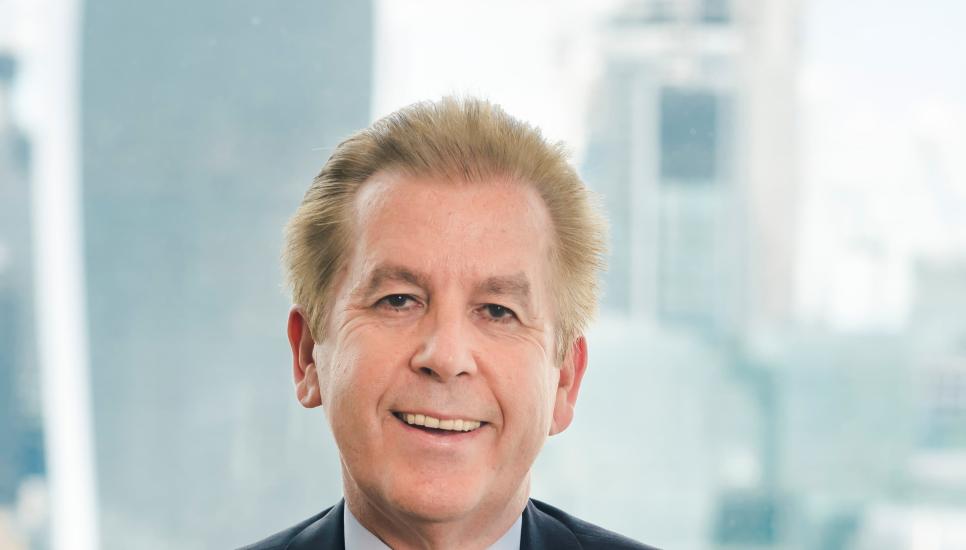40 Years of Innovation: Bernard Fairman on Foresight Group’s Growth and the Future of Energy

You founded Foresight in 1984. What was your original vision for the company, and how has it evolved over the past four decades
Bernard Fairman: In the early 1980s, the venture capital landscape was very different from what it is today. My co-founder, Peter English, and I were working at 3i, which at the time was focused on private equity, investing across a variety of sectors globally.
I didn’t see myself as a conventional employee and after about 18 months of looking for the right opportunity, in 1984, Peter and I launched our first fund, Fleming Ventures. This was a £20 million ($26.2 million) pure venture capital fund. We focused primarily on the US, with one notable exception: an investment in a French company, one of the largest smart card manufacturers globally, called GemPlus.
By 1997, we had raised our second fund. This fund was one of the early venture capital trusts (VCTs) and focused on technology – an area that saw tremendous growth during the internet boom of 2000. We managed to repay the entire fund shortly after that, and though we raised a few more VCTs over the years, it became apparent that the market was shifting. Investors were seeking more than just capital appreciation; they wanted income-generating, tangible assets.
This realisation prompted us to pivot. In 2007, we became the first UK investors in solar farms, focusing on what was then an emerging area: clean tech. Over the next decade and a half, from 2007 to 2024, this part of the business grew significantly, from zero to around £10 billion in assets under management. The private equity side of the company, which had taken a backseat for a while, was revived around 2012. We developed a regional private equity strategy, where we focused on supporting small, local businesses across the UK. We now have around a dozen offices spread across the British Isles, from Scotland to Northern Ireland and Wales, and our regional private equity funds have been largely financed by local authority pension funds.
Today, our private equity business manages around £1.6 billion with a team of 70 professionals, making it one of the largest in the country in terms of personnel and our sweet spot remains in the £1 to £5million range, actively supporting small but thriving local businesses to grow.
How do you see sustainability creating long-term value for investors, and how do you see it transforming industries?
Bernard Fairman: When it comes to sustainability, our focus is primarily on energy, specifically the energy transition. While sustainability encompasses many areas, we’ve consistently concentrated on investing in sectors where the economics make sense. Today, I believe sustainable investing has become the most profitable type of investing, especially when it involves areas like solar parks, wind farms, and similar ventures.
Back in 2007, when we first began investing in renewables, these projects relied heavily on subsidies. However, we’ve now reached a point where renewable energy is often the cheapest form of energy generation in many parts of the world. This evolution aligns perfectly with our business model, particularly in our infrastructure investments, where economic viability is paramount.
Our strategy has never been about investing solely for the sake of sustainability; it’s always been driven by strong financial returns. In my experience, asking shareholders to accept lower returns for the sake of doing good often leads to a lukewarm response. But if you can show that sustainable investments also offer the best returns – and they happen to be good for the world – that’s an ideal scenario.
How do you work with family offices for investments in nature, recovery, carbonisation and economic growth to make sure that they’re secure?
Bernard Fairman: Our focus is on two key areas: renewable energy generation and regional private equity. Renewable energy investments are real assets that typically generate stable income, and if managed properly, they come with relatively low risk. On the private equity side, we concentrate on regional buyouts of profitable companies, where we aren’t relying on heavy outside financing or taking excessive risks on a single deal. Both strategies are designed to deliver sustainable, long-term, risk-adjusted returns.
This approach is particularly appealing to family offices, which often prioritise stability and proven results. With our extensive track record – one of the longest in the market – we offer the kind of experience and consistency that these investors are looking for.

How do you tailor your strategy to suit investor profiles in family offices?
Bernard Fairman: We manage a diverse portfolio of 43 funds, each designed to meet the specific needs of its investors. Our offerings span a range of sectors, including technology, venture capital, growth equity, buyouts, clean energy, infrastructure, and natural capital. These funds vary in liquidity and risk profile, with some being private, while others offer liquidity. What’s suitable for each client depends entirely on their individual goals and risk tolerance.
For instance, when we work with large investors deploying £50-£100 million, we can tailor the strategy to their desired risk and return profile. Infrastructure investments, for example, typically offer expected returns in the range of 8% to 15%, with low to medium risk. These are stable, reliable assets. On the other hand, private equity and venture capital investments come with higher risk but also the potential for significantly higher returns.
In contrast, we also manage a £1.6 billion Inheritance Tax (IHT) investment vehicle, where the focus is much more on capital preservation. Most investors in this vehicle prioritise securing their capital, and our approach reflects this. Through careful diversification and a focus on lower-risk assets, we aim for steady, modest returns. This strategy has made our IHT vehicle a market leader, largely due to our commitment to minimising risk.
Ultimately, the type of investment we offer is guided by the specific needs and objectives of the investor. Family office investors, for example, may have non-financial priorities alongside their financial goals, and we are well-positioned to address those diverse needs at any scale.
Where do you see the opportunities over the next decade?
Bernard Fairman: We have a clear vision for the future, and central to that is the energy transition, which I believe is the greatest investment opportunity of our time. The scale of capital required for this transition is enormous, and there’s certainly no shortage of deals. Right now, we have about £5.5 billion worth of deals on our books or where we hold rights of first refusal. There are always more opportunities than we can immediately fund.
Looking back, our early belief in solar energy has been proven correct. We saw that solar, at its core, is based on semiconductor technology which has seen costs decline over time. In fact, over the past 20 years, solar costs have dropped by 95%, transforming it into the cheapest form of energy in most parts of the world.
Looking ahead to the next decade, solar will undoubtedly be one of the winners. However, we don’t see electric vehicles (EVs) as a long-term solution. In our view, they represent a cul-de-sac technology. Instead, we believe that the future lies in hydrogen, particularly for sectors like transport, where solar and other renewables aren’t as effective, such as cars, planes, and ships.
Hydrogen has always been a potential solution, but the challenge has been producing it at the right price. Now, with the growth of renewables and the variability in energy pricing – where at times we even see negative prices – there’s an opportunity to produce green hydrogen cost-effectively. When energy prices drop, surplus renewable energy can be diverted to hydrogen production, lowering the cost of electrolysis. This makes hydrogen a viable, scalable alternative for fuelling cars and other forms of transport. You can fill a hydrogen-powered car in two minutes, and it performs much like traditional fossil fuels, but without the environmental impact.
It’s becoming increasingly clear that hydrogen will play a significant part in the future of energy.
Family offices are known for their long-term view on investments. How does Foresight align with this perspective?
Bernard Fairman: Many of our investments are inherently long-term, with horizons of 25 to 35 years, particularly in sectors like solar farms and wind plants. Some of our other investments, such as pumped hydro plants, like the one we’re developing in southwestern Scotland, are even longer-term, potentially stretching to 40 years or more. We’ve always structured our funds to accommodate these extended timelines.
Over the years, we’ve developed several evergreen funds to support this long-term investment strategy. For example, we manage two large investment trusts that are open-ended, with no fixed end date. These trusts allow us to invest for the very long term. Additionally, we run a number of private equity funds that are also evergreen. One example is the Cambridge Pension Fund, which has allocated nearly £100 million to an evergreen structure with us.
While we do have some funds designed for shorter five- to seven-year cycles – common in venture capital – that approach represents a relatively small part of our overall business. Our broader focus is on accommodating the different needs of our investors, not only in terms of risk and return but also the length of the investment hold.
What are your priorities over the next decade?
Bernard Fairman: The priority for us has to be growth, and achieving that requires not only strong performance but also credibility and trust. This is particularly important when working with private offices, where trust and name recognition are essential. That’s one of the main reasons we decided to list on the FTSE 250. It significantly boosted our visibility and reputation.
Why was this important? To drive growth, we need to raise larger sums of money. For us to make a meaningful impact, we need to be raising £500 million for strategic funds, and for non-strategic funds, at least £1 billion. If we’re not operating at that scale, we aren’t moving the needle.
Name recognition plays a crucial role in this. We want to walk into a meeting with a major global fund and have them already know who we are. That was the primary purpose behind our decision to go public, and it has been highly effective in helping us achieve that goal.
What are the three things a family office should do to align its portfolio for success?
Bernard Fairman: When it comes to investing, we always start by asking a few key questions: What’s your time horizon? What’s your risk appetite? Do you have any particular preferences regarding the types of assets you want to acquire? These are essential considerations, and they vary across the wide range of funds we manage.
The answers to these questions help shape our investment approach, and because we manage such a diverse array of funds, the responses we receive lead to different outcomes.
With decades of experience, Foresight offers investors access to attractive investment opportunities that support the energy transition, decarbonise industry, enhance nature recovery and realise the economic potential of ambitious companies. To find out more, visit: https://www.foresight.group/






